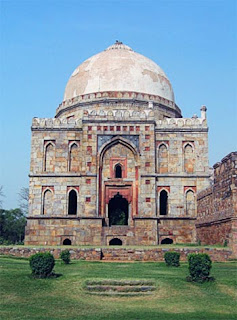Sultan of Delhi
Reign 1287 to 1290
Father – Bughra Khan
Kaiqubad assigned
the throne of Delhi after the death of Ghiasuddin Balban. Balban wanted to make
his eldest son Muhammad his successor but the premature death of the crown
prince shattered all his hopes and he himself breathed his last due to this fatal
shock. The death of Balban not only proved fatal for the dynasty of the
so-called slaves but also ended the grandeur of the Delhi sultanate. Dr.
Ishwari Prasad writes, “Authority forgets a dying king and no sooner were his
eyes closed in death than the nobles and officers opposed his last testament
and elevated Kaiqubad to the throne, an unhappy choice which ultimately led to
the fall of the slave Dynasty.”
Balban declared Kai
Khusrau his successor before his death. Comparatively, Kai Khusrau was a better
candidate. Hence the selection of Balban was justified, but the Turkish Amirs
were divided on the issue of succession after the death of Balban. Malik
Fakhruddin, Kotwal of Delhi, was the leader of one group and another group was
led by Hasan basari. Fakhruddin was against the nomination of Kai Khusru and he
wanted to enthrone Kaiqubad. He argued that in order to save Delhi from
internal conflict it was necessary to enthrone a son of Bughra Khan in place of
Kai Khusrau and at last he succeeded in putting Kaiqubad in the throne.
When Kaiqubad
ascended the throne of Delhi, he was seventeen years old. He had an attractive
personality and polite nature. He had been brought up under the strict watch of
his grandfather, Balban, who was a great disciplinarian. Barani writes that by
the time of his enthronement he had not tasted a drop of wine not had he seen the
fair face of a beautiful damsel. After his accession to the throne, he found
himself free from the bondage of his grandfather. His suppressed passions were
now in full play and he lost himself in wine, women and luxury. The splendor
and magnificence of the court changed him a lot. He became so much absorbed in
luxuries that the administration of the sultanate began to suffer. The
atmosphere of Balban’s court was completely changed. Discipline and conventions
vanished and the court became a centre for dancers and buffoons. The nobles and
courtiers also followed in the footsteps of the Sultan and gave themselves up
to luxuries and sensual pleasures. One Nizamuddin, son-in-law of Fakhruddin,
the Kotwal of Delhi, held the powers of the kingdom in his own hands and the
position of the Sultana became weak.
After the
murdered of Nizamuddin, sultan Kaiqubad made some new appointments for the
smooth running of the administration. The post of Ariz-i-Mumalik (Chief
Commander) was given to Jalaluddin Khalji. Thus the power of the Khaljis went
on increasing day by day. The Turks could not tolerate this state of affairs.
As Kaiqubad was
crippled by paralysis, Jalaluddin and the Turkish nobles installed Kayumars, an
infant child of Kaiqubad on the throne. Kaiqubad was kicked to death by a
Khalji soldier and thrown in the river Yamuna. For sometime Jalaluddin held the
charge of regent on behalf of the infant Sultan. He was got murdered after three
months and Jalaluddin took over as the Sultan of Delhi. Thus a new Khalji dynasty
came to power in place of the slave dynasty in A.D. 1290.


0 टिप्पणियाँ:
एक टिप्पणी भेजें
THANKS FOR YOUR COMMENTS
टिप्पणी: केवल इस ब्लॉग का सदस्य टिप्पणी भेज सकता है.